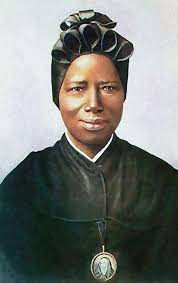The Catholic Defender: Saint Apollonia
- Donald Hartley

- 7 hours ago
- 6 min read
Deepertruth with special permission and aid with Franiciscan Media, a great team for the Lord

A holy virgin, Apollonia, lived in Alexandria, Egypt, in the third century. Christians were being persecuted there during the reign of Emperor Philip. Apollonia had spent her whole life serving God. Now that she was growing old, she was not about to take time to rest.
She bravely risked her life to comfort suffering Christians in prison. "Remember that your trials will not last long," she would say. "But the joys of heaven will last forever."
It was just a matter of time until Apollonia, too, was captured. When the judge asked her name, she courageously said, "I am a Christian and I love and serve the true God." Angry people tortured Apollonia, trying to force her to give up her faith. First, all her teeth were smashed and then knocked out. Strangely enough, that is why people frequently pray to St. Apollonia when they have a toothache. But even this painful ordeal did not shake the woman's faith.
Apollonia was then told that if she did not deny Jesus, she would be thrown into a raging fire. The woman would not let her fear overcome her. She chose to die by fire rather than abandon her faith in Jesus. When the pagans saw how heroic she was, many were converted. Apollonia died around 249.
Rather than renouncing her faith, she is said to have willingly offered up her own teeth, as well as those of her fellow martyrs, as a sign of her devotion to Jesus Christ. After her teeth were pulled out, St.Apollonia was then thrown into a fire, but she is said to have miraculously escaped the flames unharmed.

Men seized her and, by repeated blows, broke all of her teeth. Then they erected a pile of sticks outside the city and threatened to burn her alive if she refused to repeat impious words after them (either a blasphemy against Christ, or an invocation of the heathen gods). When she was given a little freedom, at her own request, she sprang quickly into the fire and was burned to death.
Apollonia belongs to a class of early Christian martyrs who when confronted with the choice between renouncing their faith or suffering death, voluntarily embraced the latter.
During the reign of Decius many Christians in Egypt were killed for their Christian Faith. Among these was the aged virgin Apollonia. The authorities tried relentlessly to make her denounce her faith. They struck her on the jaws until all her teeth came out; then they made a great fire and threatened to throw her into it if she refused to blaspheme God.
Begging a moment’s delay, she, under the inspiration of the Holy Ghost, “of her own accord leaped into the flames”. Metras, an old man, had his eyes pierced with reeds and then was stoned to death. A woman, by the name of Quinta, was the next victim. She was led to a heathen temple and ordered to worship.
After cursing the false god again and again, she was stoned to death. The homes of all the Christians were then sacked and plundered. They rejoiced at being able to suffer for Christ’s sake. A civil war among the pagan citizenry put an end to the fury for a while, but the edict of Decius, in 250, renewed the persecution, which filled the city with dread and terror. There were some who lacked the courage to remain steadfast; but many suffered willingly for their faith in Jesus.

St. Apollonia is a Christian martyr who lived in the 3rd century AD. She is one of the patron saints of dentists, as well as those suffering from toothache and other dental problems. St. Apollonia was in Alexandria, Egypt during the reign of the Roman Emperor Philip the Arab. During this time, there was a great persecution of Christians in Alexandria, and many were martyred for their faith.
St. Apollonia, who died in the year 249, was martyred for not renouncing her faith during the reign of Emperor Philip. The account of the life of St. Apollonia was written by St. Dionysius to Fabian, Bishop of Antioch. Apollonia had all her teeth knocked out after being hit in the face by a Christian persecutor under the reign of Emperor Philip.
One of the methods of torturing Christians was by pulling out their teeth, and it is said that St. Apollonia was subjected to this cruel punishment. Rather than renouncing her faith, she is said to have willingly offered up her own teeth, as well as those of her fellow martyrs, as a sign of her devotion to Jesus Christ.
After her teeth were pulled out, St. Apollonia was then thrown into a fire, but she is said to have miraculously escaped the flames unharmed. According to legend, an angel came to her aid and pulled her out of the fire.
After her release, St. Apollonia is said to have continued to spread the word of Christianity and worked as a missionary, even though her tormentors had intended to silence her. She is also considered a patron saint for those who suffer from toothache and other dental problems, as well as for dentists and those in the dental profession.

After she was threatened with fire unless she renounced her faith, Apollonia jumped into the flames voluntarily. She is considered the patron of dental diseases and is often invoked by those with toothaches. Ancient art depicts her with a golden tooth at the end of her necklace. Also in art, she is seen with pincers holding a tooth.
Saint Apollonia was one of a group of virgin martyrs who suffered in Alexandria during a local uprising against the Christians prior to the persecution of Decius. According to church tradition, her torture included having all of her teeth violently pulled out or shattered. For this reason, she is popularly regarded as the patroness of dentistry and those suffering from toothache or other dental problems.
They then erected outside the city gates a pile of wood and threatened to burn her alive if she refused to repeat after them impious words (either a blasphemy against Christ, or an invocation of the heathen gods). Given, at her own request, a little freedom, she sprang quickly into the fire and was burned to death.
In addition to a prayer book in her hands, she also holds her characteristic dental forceps with extracted tooth ; image number 076 -- exact origin unknown, but most likely a woodcut, perhaps circa 16th Century, depicting Saint Apollonia holding a martyr's palm in her left hand and dental forceps with an extracted ...

The persecution of Christians began in Alexandria during the reign of the Emperor Philip. The first victim of the pagan mob was an old man named Metrius, who was tortured and then stoned to death. The second person who refused to worship their false idols was a Christian woman named Quinta. Her words infuriated the mob and she was scourged and stoned.
While most of the Christians were fleeing the city, abandoning all their worldly possessions, an old deaconess, Apollonia, was seized. The crowds beat her, knocking out all of her teeth. Then they lit a large fire and threatened to throw her in it if she did not curse her God. She begged them to wait a moment, acting as if she was considering their requests. Instead, she jumped willingly into the flames and so suffered martyrdom.
There were many churches and altars dedicated to her. Apollonia is the patroness of dentists, and people suffering from toothache and other dental diseases often ask her intercession. She is pictured with a pair of pincers holding a tooth or with a golden tooth suspended from her necklace. Saint Augustine explained her voluntary martyrdom as a special inspiration of the Holy Spirit, since no one is allowed to cause his or her own death.
During the reign of Dionysius, Bishop of Alexandria (247-265), Apollonia was seized by the mob. She had her teeth knock-out and broken. Still, she refused to repeat impious words of blasphemy or lose her chastity during this violent attack. Instead, threw herself onto a burning fire in an act of martyrdom.
She chose to die by fire rather than abandon her faith in Jesus. When the pagans saw how heroic she was, many were converted. Apollonia died around 249.
Apollonia is the patroness of dentists, and people suffering from toothache and other dental diseases often ask her intercession. She is pictured with a pair of pincers holding a tooth or with a golden tooth suspended from her necklace.

St. Apollonia is depicted in art with a pair of pincers, or forceps, in her hand, holding a tooth. It is said that these forceps were the instruments used to extract her teeth during her torture. Additionally, she is often portrayed with a halo of flames, alluding to the fire which she was thrown into and from which she was protected by an angel during her martyrdom.
O Glorious Apollonia, Patron Saint Of Dentistry And Refuge To All Those Suffering From Diseases Of The Teeth, I Consecrate Myself To Thee, Beseeching Thee To Number Me Among Thy Clients.
Assist Me By Your Intercession With God In My Daily Work And Intercede With Him To Obtain For Me A Happy Death.
Pray That My Heart Like Thine May Be Inflamed With The Love Of Jesus And Mary, Through Christ Our Lord.
Amen.





















Comments